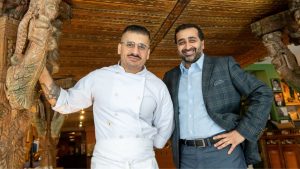Canada’s new foreign policy will involve spending billions on “hard power” military capability because the country can’t rely on an American ally that has turned inward, says Foreign Affairs Minister Chrystia Freeland.
In a major foreign policy speech in the House of Commons today, Freeland didn’t mention Donald Trump by name, but made an unabashed pitch for the international rules-based order that the U.S. president’s America First policy is attacking.
The speech was meant to foreshadow the release of Wednesday’s defence policy review, when Defence Minister Harjit Sajjan is expected to make the case for billions in new military spending.
OBJ360 (Sponsored)

Oakview Capital Inc. is the solid option for your real estate investment portfolio
You know a real estate investment is sound when your advisors put their own money behind it.

Vegan? Halal? Gluten-free? This Ottawa restaurant has you covered
For food lovers who have dietary restrictions, it can often be a challenge to find a restaurant that checks all the boxes.
“To put it plainly: Canadian diplomacy and development sometimes require the backing of hard power,” Freeland said.
“Principled use of force, together with our allies and governed by international law, is a part of our history and must be a part of our future.”
Finance Minister Bill Morneau hinted in an interview that future defence budgets could become noticeably fatter after his department spent “a huge amount of time” working on the defence review.
“What minister Freeland was saying is that we recognize the importance of our commitment to our military,” Morneau said.
“We understand the nature of the challenges that we’re facing right now with terrorism and broader public safety issues, so as we put forward our investments, that’s the context.”
Freeland said Canada doesn’t need an inward-looking “Canada First” foreign policy, but given that the U.S. is now questioning the worth of its global leadership, it is more important than ever for Canada to plot its own course in the world.
Her emphasis on hard military power is a tougher expression of the country’s international interests than Canadians are used to hearing. In the 1990s, her Liberal predecessor, Lloyd Axworthy championed a “soft power” agenda that focused on protecting civilians in armed conflict at a time when the government of the day was cutting defence spending.
“The accent on hard power is interesting,” said Fen Hampson, head of the global security program at the Centre for International Governance Innovation. “The Liberals have traditionally been soft power champions and she is saying that Canada needs both.”
Freeland said that notwithstanding the “incredibly good relationship” with the U.S., Canada cannot simply depend on American military protection.
“To rely solely on the U.S. security umbrella would make us a client state,” she said.
“Such a dependence would not be in Canada’s interest.”
The speech affirmed Canada’s support for multilateralism and rules-based international systems, human rights, gender equality, fighting climate change and spreading economic benefits more widely.
She said Canada played a major role in shaping the global order after the Second World War because the country, including her own family, suffered heavy losses in two world wars.
The U.S. has been an indispensable nation in leading the world since then, she said, but that is changing and Canada has to adapt.
“It would be naive or hypocritical to claim before this House that all Americans today agree,” she said.
“Indeed many of the voters in last year’s presidential election cast their ballots, animated in part by a desire shrug off the burden of world leadership. To say this is not controversial: it is simply a fact.”
She reiterated the government’s disappointment in the U.S. decision to withdraw from the Paris Agreement on climate change.
“International relationships that had seemed immutable for 70 years are being called into question,” she said.
“And new shared human imperatives – the fight against climate change first among them – call for renewed uncommon resolve.
She also addressed the protectionism – again without mentioning Trump by name – that has taken root in the U.S. and elsewhere, suggesting that stance is on the wrong side of history.
“Beggar-thy-neighbour policies hit middle powers soonest and hardest,” she said. “This is the implacable lesson of the 1930s and the Great Depression.”
Freeland said after the speech she spoke Monday to U.S. Secretary of State Rex Tillerson to explain the context of her remarks about his country.
Paul Heinbecker, Canada’s UN ambassador when the U.S. invaded Iraq in 2003, said Freeland’s speech contained enough complimentary reminders about the sacrifices of the U.S. as a world leader to placate the Americans.
Even so, recent history has shown Canada has the ability to disagree with the U.S., he said.
Heinbecker said he advised the Liberal government to stay out of the Iraq campaign, “and there were some people in the federal government who said, ‘Oh my, we can’t disagree with Washington on something as important as a war.’
“It turned out not only could you, we did. And there were no consequences, virtually.”





